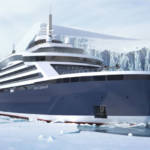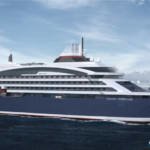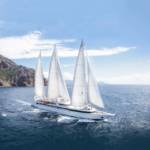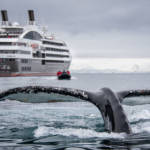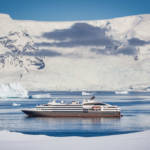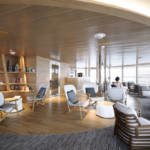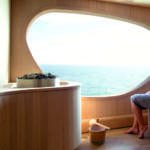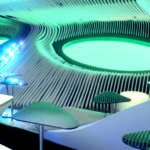The cruising industry was born in the romanticism and exclusivity of the early transatlantic voyages. Since then, the industry has grown exponentially. Now, 27 million passengers embark every year across the globe. What’s more, predictions foresee an ever-increasing number of boats, passengers and revenue over the decade to come. Statista expects a 40 per cent leap from $37 billion to $57 billion in cruise ship revenue by 2027.
Tried, tested and refined over decades, the cruise ship experience can be tailored to meet the needs of any traveler. The industry appears to be onto a winner.
Yet there is a dark cloud that hangs over this industry. Quite literally: the crude oil-guzzling ships pump out enormous black clouds of pollutant as they drift around the globe. Alongside air pollution, ballast water, grey water, black water, chemical pollution, solid waste and oil waste are spewed from the ships. Noise pollution also has serious effects on the natural environment into which cruise ships venture – especially those places at the earth’s extremities or where there is scarce human presence.
As any holiday brochure will tell you, cruises are about traversing the globe to appreciate its beauty. Yet the enormous environmental damage that cruise ships cause seems to be at odds with this aim. It appears, for the cruise ship industry, there is some introspection and environmental realignment required.

This is very much the thinking of cruise line, Ponant. Founded by several former members of France’s Merchant Navy, the relatively young company is part of a new era of cruising that seeks to reconcile world-class cruising with sustainability.
The company is unabashedly French, and uncompromisingly luxurious. Indeed, I must also mention that the company was recently purchased by Artemis – placing it in the same category as the world’s top fashion brands such as Gucci, Saint-Laurent and Alexander McQueen. Take a look at the ship’s interior designed by Jean-Philippe Nuel and you will think such a classification is justified.
The exterior is the epitome of sleek, too. Park one of Ponant’s boats in Monte Carlo’s Port Hercules and you would not bat an eyelid. A scaled model of one of their ships would not look out of place on the desk of Roman Abramovich.
In spite of the luxury tag that so often goes hand-in-hand with waste and excess, Ponant’s chief motivation is environmentalism and ecological preservation. Ponant is a member of the International Association of Antarctica Tour Operators (IAATO) and a signatory of France’s La Charte Bleue d’Armateurs (“The Ship-owners Blue Charter”), which demands that the company adhere to strict rules about the protection and preservation of any ecologically fragile places the boat may visit.
Discover the treasures of the world by sea…
Aided by their size, Ponant ships have been given the go-ahead to cruise world-wide UNESCO sites, an opportunity bestowed only upon the cleanest and least invasive vessels.
So far, four ships in the Ponant fleet have all been awarded Bureau Veritas’ “Clean Ship” award, which attests that L’Austral, Le Boreal, Le Soleal, and Le Lyrial vessels each use the most cutting-edge and environmentally friendly technology to run the ship.
In practice, this means the electric propulsion system reduces fuel consumption by up to 30 per cent. Anchor-free stopping technology protects reefs and other sensitive ecosystems. The boats’ sewage is never dumped in the water (only ashore), and water used in showers and washing machines gets recycled for cleaning purposes in various parts of the boat. The boats’ LED and CFR lights use up to ten times less electricity than conventional lighting and the ships’ navigators use technology that includes sonar and 3D mapping to avoid injuring marine mammals.
Over the next 2 years, 6 new vessels named after some of France’s great explorers will join the fleet: Le Champlain & Le Laperouse this year; Le Bougainville & Le Dumont-d’Urville in 2019; and Le Surville & Le Bellot in 2020.
As with the exclusivity of the boats, the destinations of these boats are equally select. Thanks to massively reduced ecological intrusiveness, the nimble design allows these boats to go into shallower waters and narrower passages – well beyond where any ninety-thousand-tonne mega-ship could blunder. It is for this reason that Ponant ships are some of the few cruise vessels that can venture deep into the Arctic Circle. Building on this reputation, Ponant recently announced their creation of an electric hybrid icebreaker ship to be released in 2021, which operates on both electric and liquefied natural gas with almost zero emissions.
In recognition of this, it has recently been announced that National Geographic will partner with Ponant to create over 100 new cruise itineraries that offer experiences that seek to value and preserve precious areas of nature and geography, while revealing their beauty to the lucky passengers of the Ponant vessels.
Cruises with the French touch…
Perhaps the most noteworthy aspect of Ponant’s new ships are the underwater viewing lounges designed by aquatic habitat architect, Jacques Rougerie. Based in the hull of each new ship, the lounge is biomimetically designed, which means it moves and responds to the environment around it. State-of-the-art acoustic technology developed in consultation with specialists from the French Research Institute for the Exploitation of the Sea (IFREMER) allow passengers not only to hear, but feel the oceanic vibrations through ‘body listening sofas’.
While Ponant’s vessels may be out of the price bracket for many, they are among the first to take truly bold and necessary steps to reduce the environmental impact of the cruise ship industry. And, of course, the more these technologies are developed, the more easily they can be adopted by other liners and developed for a range of vessels.
Hopefully, then, this is a key moment for the cruise industry. The importance of environmental care and ecological impact will only get stronger – governments will only continue to clamp down on vessels that damage the environment. Therefore, it will be liners like Ponant that will ensure that we can enjoy sea-faring expeditions for years to come.
Learn More: www.unicorncruises.com

